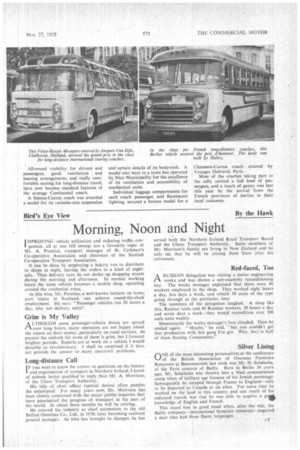Morning, Noon and Night
Page 49

If you've noticed an error in this article please click here to report it so we can fix it.
I MPROVING vehicle utilization and reducing traffic con gestion, all at one fell swoop, arc a favourite topic of Mr. A. Prentice, transport manager of St. Cuthbert's Co-operative Association and chairman of the. Scottish Co-operative Transport Association.
It can be done by employing a bakery van to distribute to shops at night, leaving the orders in a kind of nightsafe. Thus delivery vans do not choke up shopping streets during the morning and afternoon. In normal working hours the same vehicle becomes a mobile shop, operating around the residential areas.
In this wise, Mr. Prentice, a well-known lecturer on transport topics in Scotland, can achieve round-the-clock employment. He says: "Passenger vehicles run 20 hours a day, why not delivery units?
Grim is My Valley
A LTHOUGH some passenger-vehicle duties are spread over long hours, many operators arc not happy about the return on their money, particularly on rural services. At present the outlook for some of them is grim, but I forecast brighter periods. Experts are at work on a vehicle I would describe as revolutionary. I shall be surprised if it does not provide the answer to many operators' problems.
Long-distance Call
I F you want to know the answer to questions on the history and organization of transport in Northern Ireland, 1 know of nobody better qualified to reply than Mr. A. Morrison, of the Ulster Transport Authority.
His title of chief officer (special duties) often puzzles the uninitiated. For many years now, Mr. Morrison has been closely concerned with the major public inquiries that have punctuated the progress of transport in his part of the world. In about three months he will be retiring.
He entered the industry as chief accountant to the old Belfast Omnibus Co., Ltd., in 1930, later becoming assistant general manager. As time has brought its changes, he has served both the Northern Ireland Road Transport Board and the Ulster Transport Authority. &Nile members of Mr. Morrison's family are living in New Zealand and he tells Me that he will be joining them there after his retirement.
Red-faced, Too
ARUSSIAN delegation was visiting a motor engineering works and was shown a sub-assembly reconditioning bay. The works manager explained that there were 40 workers employed in the shop. They worked eight hours a day, five days a week, and rebuilt 50 units of the type going through at the particular time.
The members of the delegation laughed. A shop like this, Russian tools and 40 Russian workers, 10 hours a day and seven days a week—they would recondition over 100 such units weekly.
Momentarily the works manager's face clouded. Then he smiled again. "Maybe," he said, "but you couldn't get that production with this gang I've got. Why, they're half of them flaming Communists."
Silver Lining
ONE of the most interesting personalities at the conference of the British Association of Overseas Furniture Removers at Bournemouth last week was Mr. H. SehaIscha, of the Paris concern of Bailly. Born in Berlin 34 years ago, Mr. Schalscha was thrown into a Nazi concentration camp when of military age because of his Jewish parentage. Subsequently he escaped through France to England—only to be deported to Canada as an alien. For some time he worked on the land in this country and one result of his enforced travels was that he was able to acquire a gill knowledge of English and French.
This stood him in good stead when, after the war, the Badly company—international furniture removers—required a man who had three fluent languages.








































































































